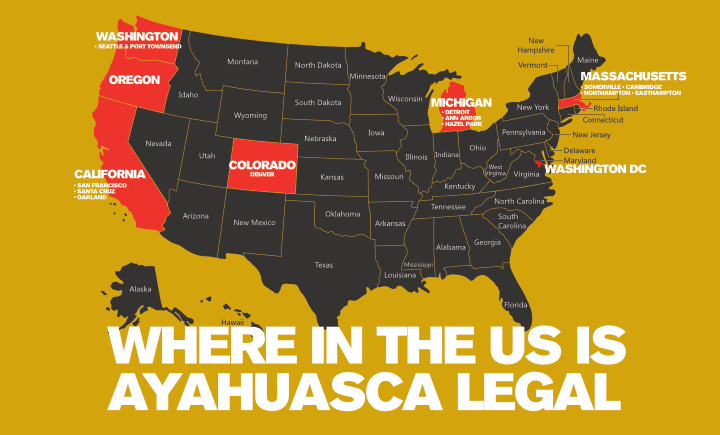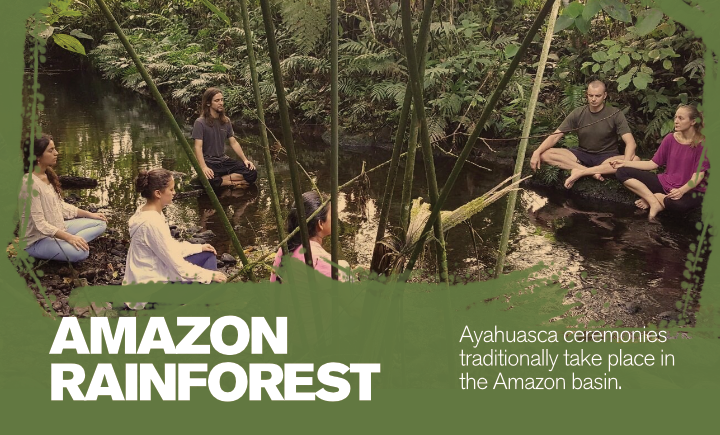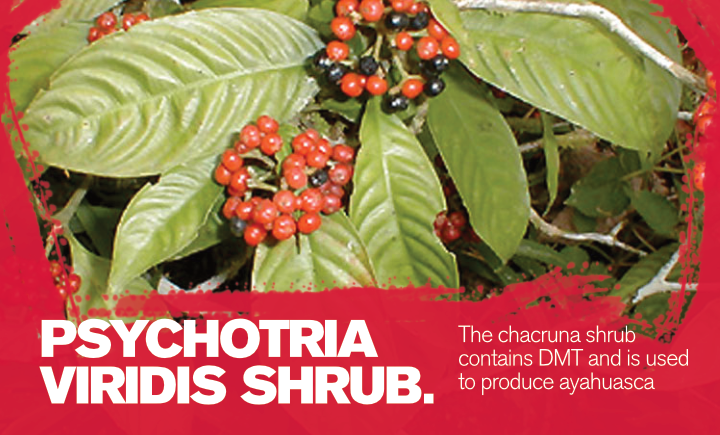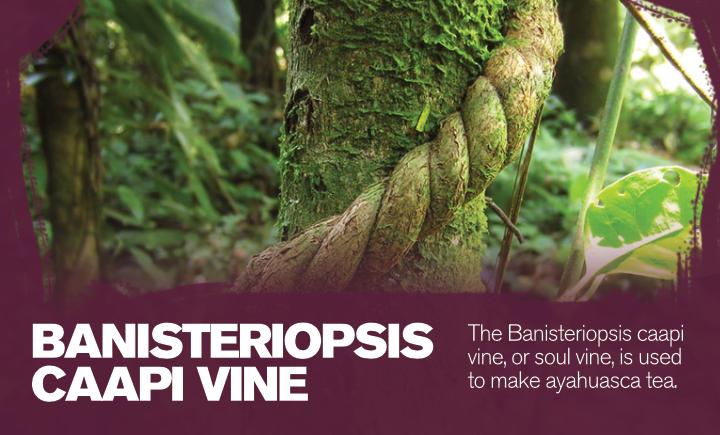Is Ayahuasca Legal?
- Ayahuasca
- Psychedelics
-
Feb 10
- Share post


More and more people are openly discussing their psychedelic and spiritual experiences with ayahuasca, but is it legal?
It all depends on where you are!
Specific locations have a legal status of ayahuasca, others have decriminalized it, and some have stayed vague and quiet about it.
Where To Do Ayahuasca (Legally)
If you want to immerse yourself in the cultures where ayahuasca’s plants grow naturally, travel to South America and the Amazon basin. You may be able to find safe ayahuasca retreats in these areas.

Ayahuasca in Peru
The two plants used to produce ayahuasca, Banisteriopsis caapi and Psychotria Viridis, are native to Peru. Indigenous people have used ayahuasca for medicinal and spiritual purposes in Peru for centuries. As a result, the country has made ayahuasca legal as a part of traditional medicine.
When the United Nations signed the Convention on Psychotropic Substances of 1971 to control psychotropic substances, Peru submitted a reservation that included ayahuasca and the San Pedro cactus.
Ayahuasca in Brazil
Brazil is another country comprised of native land for ayahuasca’s mother plants. Some churches in Brazil use ayahuasca as a part of their religious ceremonies, and the government made the use of ayahuasca fully legal in 1992.
Not only is it legal to take ayahuasca in Brazil, but it is also legal to cultivate its plants.
Ayahuasca in Ecuador
Ecuador is similar to Peru when it comes to ayahuasca. The plants grow natively on its land, and Ecuador’s indigenous people have used ayahuasca as a part of their spiritual and medicinal rituals for thousands of years. In Ecuador, the use of ayahuasca as traditional medicine is legal.
Looking for a place where ambiguity leads to a fantastic ayahuasca experience? Then head to Costa Rica in Central America.
Ayahuasca Experiences in Costa Rica
When it comes to ayahuasca, Costa Rica is a gray area. Ayahuasca is considered an unscheduled substance there.
Costa Rica offers no specific stance on the substance and has not impeded retreat centers from operating freely. For this reason, many feel that Costa Rica is a safe locale to flock to for ayahuasca ceremonies. There are some locations in Europe where ayahuasca is decriminalized.
But before you head across the pond for an ayahuasca retreat, double-check this psychedelic plant’s legality, as legislation is still changing!
Italy
Italy used to be the only European country where ayahuasca was entirely legal. However, in early 2022, the country’s government made ayahuasca’s plants and components Schedule 1 controlled substances, thus making ayahuasca illegal in Italy.
Portugal
While ayahuasca isn’t legal in Portugal, it has been decriminalized. That means that if caught in possession of the substance, offenders won’t be treated with criminal charges. However, there will still be some form of consequence. It is still illegal to brew, sell or transport ayahuasca in Portugal.
Spain
Similar to Portugal, Spain has decriminalized the possession of ayahuasca. However, it is decriminalized in Spain only for specific circumstances, like for approved medicinal purposes or research.
Is Ayahuasca Legal in The United States?
The n,n-dimethyltryptamine (DMT) found in ayahuasca is the chemical substance that makes ayahuasca a psychedelic hallucinogenic. But is DMT legal? And is ayahuasca legal in the U.S.?
What is DMT
DMT is a psychedelic substance known for creating visual and audible hallucinations. Like psilocybin, it is a naturally occurring substance in many plants.
You may know DMT by one of its aliases, like Dimitri or fantasia.
DMT is deemed a Schedule 1 controlled substance in the U.S., making it illegal. There are, however, some legal exceptions and a growing list of locales that have decriminalized ayahuasca here in the States. Understanding the substance’s legality is the first step in finding out where to get ayahuasca in the USA.
Decriminalization Efforts in the United States 2022
While ayahuasca isn’t entirely legal in the United States, the substance has been decriminalized in a few cities. You can have the psychedelic substance in these locations and not face criminal charges. The push to decriminalize ayahuasca is part of a more significant movement to legalize entheogenic plants and fungi in the U.S. eventually; This movement includes plants and fungi that contain dimethyltryptamine (DMT), psilocybin (think magic mushrooms), mescaline (the San Pedro cactus), psilocin (also magic mushrooms) and ibogaine (the psychedelic shrub also known as iboga).
Most that have passed resolutions to decriminalize these substances include language in their legislation that makes pursuing people who use these plants a low priority for law enforcement in those areas.
Religious Ayahuasca Ceremonies in The States
There is an exception to the federal law pertaining to ayahuasca use in the U.S. regarding religious ceremonies. Two “ayahuasca churches” are legally allowed to use ayahuasca as a part of their religious use.
“Ayahuasca Churches”
The Santo Daime and Unio do Vegetal (UDV) churches, founded and based in Brazil, have branches in the United States. They legally participate in ayahuasca ceremonies and brew ayahuasca’s hallucinogenic tea. The Native American Church (NAV) also has a similar legality with peyote in that the church can use the substance legally as a part of its religious ceremonies.
Other organizations, such as Soul Quest and Ayahuasca Healings, have petitioned the DEA (Drug Enforcement Agency) for religious exemptions to use of ayahuasca in spiritual ceremonies.
Where To Get Ayahuasca in The United States
Oregon
In November 2020, Oregon residents voted to decriminalize the possession of illegal drugs throughout the entire state, passing Measure 110.
Measure 110 went into effect on February 1, 2021, and pertained to all controlled substances, including ayahuasca.
California
California legislators are working on getting Senate Bill 519 approved, intending to legalize the gifting of small amounts of certain psychedelics for people of age 21 and older.
The bill had some resistance when it went before the Assembly Appropriations Committee in August of 2022, and the bill’s sponsor pulled it. SB 519 is expected to be reintroduced in 2023.
While the state of California has not decriminalized or legalized the use of ayahuasca and other psychedelics, a few cities have already moved forward with decriminalization.
Oakland
In June 2019, the City Council of Oakland approved a resolution by unanimous vote to decriminalize ayahuasca, DMT, peyote, and psilocybin mushrooms.
Santa Cruz
Santa Cruz became the third city in the United States to decriminalize natural psychedelics such as ayahuasca, psilocybin mushrooms, and peyote in January 2020. (with Denver and Oakland being first and second).
San Francisco
Then, in September 2022, the Board of Supervisors in San Francisco had a unanimous vote to decriminalize ayahuasca and psilocybin mushrooms.
Michigan
The state of Michigan has not decriminalized psychedelics; entheogenic substances have been legalized in several cities.
Ann Arbor
The Ann Arbor City Council made entheogenic plants and fungi legal again in September 2020. This legalization includes ayahuasca and plants with DMT, psilocybin, mescaline, and ibogaine.
The City Council’s unanimous vote concerned not only the possession of these substances but also their personal use and cultivation.
Soon after, the measure was expanded to cover the entire county of Washtenaw.
In November 2021, Detroit voters passed an initiative called Proposal E: Entheogenic Plants.
Personal possession and therapeutic use of entheogenic plants, including tryptamines (like DMT), phenethylamines, and indole alkaloids, were decriminalized under this proposal.
Hazel Park
In March 2022, Hazel Park followed suit in decriminalizing entheogenic plants by a unanimous vote. The city included cultivation, distribution, purchasing, and possession in its decriminalization measure.
Massachusetts, Somerville
Cities in Massachusetts were hard at work in 2021, with four decriminalizing ayahuasca within the year.
In January 2021, a unanimous vote was passed by the City Council of Somerville decriminalizing entheogenic plants, specifically mentioning ayahuasca, iboga, cacti, and psilocybin mushrooms.
Cambridge & Northampton
Cambridge followed suit just one month later, in February 2021, as did Northampton in March 2021.
Easthampton
Easthampton wasn’t far behind in decriminalizing these psychedelic plants, with the City Council approving a resolution in October 2021.
Washington
Two cities in Washington voted unanimously to decriminalize ayahuasca and its plant and fungi friends.
Seattle & Port Townsend
Seattle was the first city to proceed with decriminalization in October 2021, followed by Port Townsend just a few months later in December 2021.
Washington DC
The residents of the nation’s capital voted in November 2020 to approve Initiative 81 (or I-81), the Entheogenic Plants and Fungus Measure.
This Initiative decriminalized the personal possession, use, cultivation, and distribution of plants and fungi containing DMT, mescaline, ibogaine, psilocybin, or psilocin.
Technically, it still is not legal to buy ayahuasca in D.C. Still, there are I-81 compliant shops that will gift you entheogenic plants when you purchase another item (like a sticker, shirt, or piece of art).
Best Ayahuasca Retreats
Now that you know all the places you can sip some ayahuasca brew, where can you find the best ayahuasca retreats?
Before you pick your retreat, you’ll want to research and ensure the facility you choose provides a responsible, holistic experience.
They help you prepare for your ayahuasca ceremony before you arrive and help you integrate ayahuasca into your daily life after you leave, in addition to providing a safe environment at the retreat.
Ayahuasca Retreats in Brazil
Spirit Vine is a highly-rated ayahuasca retreat in Bahia, Brazil, that fosters a spiritual journey in the heart of the Amazon. You can choose from participating in a nine- or 11-day experience, which includes daytime and nighttime ayahuasca ceremonies.
They also include workshops to help aid in your spiritual journey during your time at the retreat.
Ayahuasca Retreats in Peru
Peru is a great place to travel for an ayahuasca retreat if you want a traditional experience in the substance’s native land. The Temple of the Way of Light centers its ayahuasca retreats around the traditional healing practices of the indigenous Shipibo tribe.
The Temple provides a 12-day ayahuasca retreat experience focused on aligned living in the middle of the luscious rainforest of the Amazon basin near Iquitos, Peru. They also offer retreats tailored to specific communities. The Temple hosts a women’s retreat, an LGBTQ retreat, and a healthcare professional retreat.
In 2017, the Beckley Foundation and ICEERS chose The Temple as their host for a scientific ayahuasca study.
Ayahuasca Retreats in Costa Rica
Rythmia is a luxury resort-styled all-inclusive ayahuasca retreat center in Guanacaste, Costa Rica. The facility is a medically-licensed plant medicine center with shamans trained by Taita Juanito in the Colombian ayahuasca tradition.
Rythmia offers a 7-night ayahuasca retreat that includes activities to help enhance your experience, like yoga, breathwork, and workshop courses.
What is Ayahuasca
Alright, so you know the legality of ayahuasca and where you can go for a retreat, but what exactly is this psychedelic substance?
The Psychoactive Components of Ayahuasca

Ayahuasca’s psychoactive and hallucinogenic effects are produced by combining two different plants when they are brewed together. The bark of the Banisteriopsis caapi vine, also known as the soul vine, and the leaves of the Psychotria Viridis shrub, also known as chacruna, are boiled together to make ayahuasca tea. The bark of the caapi vine contains beta-carbolines, and the chacruna leaves contain n-n, dimethyltryptamine (DMT).

The DMT in the chacruna leaves is activated through the mouth when it reacts with the beta-carbolines in the caapi vine, resulting in the psychoactive ayahuasca brew.
The Physical Effects of Ayahuasca
Drinking ayahuasca tea will result in a psychedelic trip lasting anywhere from four to six hours. The desired effects of ayahuasca include euphoria, increased connectivity and introspection, and both visual and audible hallucinations.
The tea can result in some physical reactions, like nausea, vomiting, and diarrhea. While these side effects aren’t exactly a pleasant experience, they are seen by most indigenous cultures as a positive form of cleansing induced by the tea.
When going on a spiritual journey with ayahuasca, it’s essential to have a trustworthy and knowledgeable shaman that will help set the tone of your experience and guide you through a safe ceremony.
Ayahuasca can lead to a bad trip that can spark fear, panic, and anxiety if done in a poorly controlled setting.
It’s also essential to ensure that your ayahuasca shaman has helped you prepare and cleanse your body for this experience properly, as ayahuasca can have dangerous reactions when mixed with other substances.
A Brief History and Tradition of Ayahuasca
Ayahuasca use dates back centuries. Indigenous tribes in the Amazon basin in South America have traditionally used ayahuasca in ritual settings for spiritual and medicinal purposes. In the Upper Peruvian Amazon, ayahuasca was usually used by healers in the indigenous Shipibo culture to diagnose physical, mental, and spiritual ailments in their patients. The Shipibo healers also used ayahuasca to attain higher knowledge and spiritual connectivity.
The indigenous Shuar from the Andes regions in Ecuador and Peru believe that the experience had while on ayahuasca is actual reality, with the non-ayahuasca moments being an illusion.
As the world has grown more connected in recent decades, ayahuasca’s appeal has spread worldwide.
Many Westerners seek ayahuasca ceremonies as a spiritual way to heal from addictions, trauma, and mental health issues. In contrast, others seek more excellent spiritual connectivity and enlightenment.
